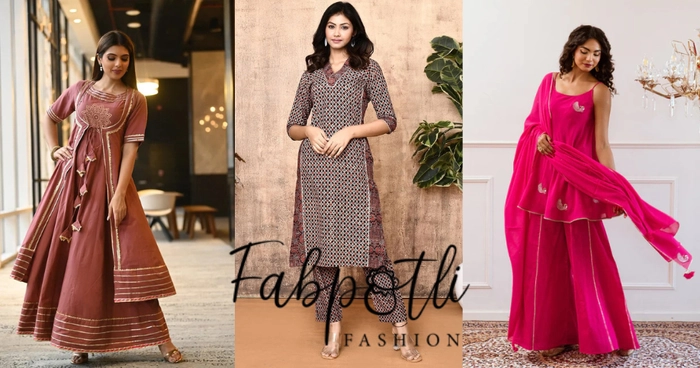Ethnic fashion is changing in real-time, and the shift feels almost electric. Shoppers now check labels for more than pretty patterns. They're hunting brands that thread together culture with care for people and the planet.
The Rise of Ethical Ethnic Wear
Heavy drift toward fast fashion shoved timeless craft off center stage. Bottom-line pricing drowned out the stories woven into every saree, kaftan, and dashiki. Newly minted designers are hitting rewind, pulling those stories back into the spotlight. Sustainability, fair pay, and thoughtful making sit at the head of the table instead of at the edges.
Eco-minded labels don't stop at good looks. Many source organic cotton, plant-based dyes, and upcycled fabrics even if it squeezes profit margins. Behind the sewing machine, wages climb, schedules level out, and old skills survive because artisans keep earning their keep. The result? Clothes that look great, feel good to wear, and leave a lighter step on the Earth.
Sustainable Fabrics: Comfort, Quality, and Care
Walk into any ethical clothing shop, and you'll probably bump into racks of organic cotton, linen, bamboo, or silky-soft modal. Those fabrics are eco-rock stars. They breathe, they feel great against your skin, and, because their growers skip nasty pesticides, the planet gets a breather too.
When brands add natural dyes or stick with time-honored dyeing tricks like indigo pots or turmeric tubs, the eco-goodness gets a serious boost. Outfits dyed this way usually stay in our closets longer and leave a smaller dent in landfill numbers.
Preserving Craftsmanship and Supporting Artisans
Slow fashion loves the human touch, and nothing says hands-on like handwoven shawls or block-printed kurtas. Many ethical labels team up with artisans whose skills were handed down like secret family recipes. That partnership keeps the crafts alive while paying the makers fairly and on time.
Because most of that work is done one piece at a time, no two garments are exactly alike. Each item shows little quirks and patterns that whisper, I come from somewhere special, turning an everyday outfit into a slice of living culture.
Minimizing Waste and Pollution
The fashion world dumps a staggering amount of leftovers and chemical sludge each year. Ethical ethnic brands turn that trend on its head by cutting waste at every step of making a shirt or a sari. Designers study their patterns until not a scrap is left, and old material gets woven back into new cloth instead of heading to a landfill.
A few labels take things further and ask customers to return worn pieces so the fabric can be remade again and again. Handing a loved garment back not only gives the item a second chance, it nudges all of us toward shopping with our eyes wide open.
Fair Labor and Community Care
Fair pay is the spine of any clothing line that claims to be ethical. Garment farmers, ditch-diggers, seamsters—every worker in the chain is promised a safe space and a wage that lets them live, not just survive. That steady baseline stands in sharp contrast to the bargain-basement deals of fast-fashion empires.
The story of justice doesn't stop when the last stitch is sewn. Many artisans' collectives pour part of their earnings into local schools, health clinics, or small training workshops, lifting whole neighborhoods as they grow. Shoppers who pick these labels know exactly who stitched their hem and that the answer is a community doing just fine.
The Appeal of Ethical Ethnic Wear
Picking an ethical ethnic outfit today feels less like a shopping decision and more like joining a movement. Shoppers want quality they can trust and styles that won't fall apart after one wash. A well-made kurta or dupatta shows up for Diwali dinners, weekend picnics, and even that surprise Zoom call that crops up on Tuesday morning.
The booming ethnic wear market gives buyers a real chance to vote with their wallets. Designers who care about people and the planet are now offering wider size ranges and fresh patterns so everyone can slip into something that feels just right. When a woman finally zips up a piece made from fair-trade cotton, she usually hunts for a mirror because confidence looks good in every reflection.
Consumer Awareness and the Future of Fashion
Awareness, not advertising, has become fashion's loudest trumpet. People land on an online shop and only half-joke, Show me the story behind this seam. Influencers, DIY reels, and a barrage of hashtags keep that question trending. Shoppers are discovering the origins of their clothing, the materials used in them, and the impact of their purchases.
Social media, fashion influencers, and advocacy campaigns are playing a key role in spreading this message and inspiring more people to choose responsibly. Cultural threads that care for their makers are no longer just whispers in the market; they're roaring to center stage. These labels focus on fair pay, eco-friendly scraps, and the art of storytelling through cloth, nudging the whole industry toward a kinder future.
Wrap-Up
Style used to ride rough-shod over landscapes and laborers, yet countless women's wardrobes now prove softness, conscience, and flair can stroll together. FabPotli stands shoulder-to-shoulder with that change, crafting vibrant pieces that hug curves and ideals alike. Slip into ethical fashion and you don't simply look good—you take a quiet stand for everyone behind the seams.

